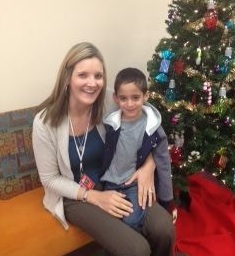With Telemedicine, Pediatric Nurse Practitioner Extends Her Care of Special Needs Children from Phoenix to Northern Arizona

Pediatric nurse practitioner Amber Wright schedules initial patient visits for 90 minutes. A follow-up visit is 60 minutes, or sometimes 45.
The reason for these longer-than-usual appointments is that Wright is certified in the field of developmental pediatrics, in which she focuses her practice on children with developmental disabilities.
Her patients range in age from six months to 18 years.
“At each appointment, we go over many areas of a child’s life, and their functioning within the family, and at school,” says Wright, who works in the Developmental and Behavioral Pediatrics Clinic in Barrow’s Neurological Institute at Phoenix Children’s Hospital. She also is co-director of Barrow at Phoenix Children’s Multidisciplinary Down Syndrome Clinic.
“Seeing kids gives me a really good sense of their activity level when they are expected to sit still and attend to something, it also clues me in on what the parents see as an issue or don’t perceive as an issue, and being able to see that and point that out in a gentle way to families can be really enlightening to families.
“Obviously, with a five-to-10 minute visit we’re not going to get a very clear picture of how their autism, for example, is affecting them.
“And we’re also establishing a relationship with the family so we can make sure the family is following up on all the recommendations for therapies and school services, and other things their child needs in order to be successful, and have the best possible outcome.”
Wright started her work as a nurse in pediatric emergency medicine, after working with children and adults with special needs, as a rehabilitation provider. “I loved my work in the ER,” she says, “but when I became a nurse practitioner, I was wanting more of a connection with my patients than what you can have in an emergency room setting.”
While studying at Arizona State University to become a nurse practitioner, Wright had a rotation with Scottsdale physician Elaine Ellis, MD, who specializes in developmental pediatrics.
“I just loved it,” Wright says. “Developmental pediatrics is one of those specialties where what we do with the kids doesn’t hurt them. We’re not poking them or prodding them or requiring them to go through surgery or anything like that.”
About two years ago, Wright and her husband moved to Flagstaff, where he studied at Northern Arizona University. Wright worked with Flagstaff Medical Center and Phoenix Children’s Hospital to establish a developmental pediatrics program in Flagstaff, with support from Phoenix Children’s.
Wright gradually built up a full-time clinic there, but life events brought the couple back to Phoenix.
 “I certainly had grown attached to my families in Flagstaff, and realized they would have to travel three or four hours to come to Phoenix for appointments,” she says. “We already had been doing a little bit of telemedicine, and I was able to convince Phoenix Children’s Hospital and Flagstaff Medical Center to continue my Flagstaff clinic via telemedicine, and we’ve been doing that now since February of 2015.
“I certainly had grown attached to my families in Flagstaff, and realized they would have to travel three or four hours to come to Phoenix for appointments,” she says. “We already had been doing a little bit of telemedicine, and I was able to convince Phoenix Children’s Hospital and Flagstaff Medical Center to continue my Flagstaff clinic via telemedicine, and we’ve been doing that now since February of 2015.
“Flagstaff schedules patients and I do the telemedicine follow-up clinic on Wednesday mornings. Patients come to Flagstaff Medical Center and they have their vital signs, their height, weight, and blood pressure recorded, and that’s all loaded into the system for me to review, since a lot of the visits that I see in this manner are medication management patients, some with ADHD taking stimulant meds that affect their growth and their vital signs.
“And then, once the patient is in the room, I’m seeing them and hearing them, obviously, through the telemedicine connection. And I have a Littman stethoscope, to listen to their heart and breath sounds. Some of my kids are bouncing off the walls, and others are being silly and making faces, but the kids generally like telemedicine. They love electronics. And so they are happy to have the visit that way.
“I have worked with a couple of families who found it too difficult to contain their child and still be able to maintain that connection with me, to hear me talk, or for me to be able to see and hear the child’s breaths,” she says. “So those parents have elected to come to Phoenix to see me. But the vast majority of the Flagstaff families have preferred telemedicine to having to come all the way down here. The parents, generally, love telemedicine.”
